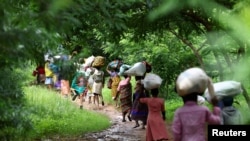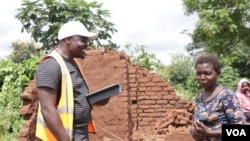President Lazarus Chakwera said this week Malawi has lost $500 million to Tropical Cyclone Freddy. The cyclone, which also affected Mozambique and Madagascar, hit 15 districts in southern Malawi, rendering nearly 700,000 people homeless.
"After this emergency period has passed, our experts also estimate that the work of recovery and reconstruction will cost an additional 700 billion Kwacha, funds we do not have, and which are outside our recently passed budget," he said.
Chakwera said Malawi would respond to the problem like a nation under attack, not a nation under threat.
He appealed for international help with rebuilding infrastructure lost to Freddy.
"This is why the state of national disaster that I declared on March 13 to call for international support remains in force, and why I will use few upcoming international gatherings of world leaders to directly engage them with specific proposals on how they can support us with the daunting task we have going forward," Chakwera said.
Chakwera left the country Wednesday for the United Kingdom, where he expected to meet world leaders during the coronation of King Charles III of Britain.
Chakwera's appeal comes two weeks after the U.N. renewed a flash appeal to humanitarian partners made in April for $70.6 million to support cyclone victims in Malawi. The U.N. says less than 11 percent was donated.
The U.N. Resident Coordinator's Office in Malawi could not respond to a questionnaire from VOA on Monday on its contribution toward cyclone recovery efforts in Malawi.
However, despite funding shortfalls facing the government and its partners toward recovery efforts, a group of well-wishers in Malawi is contributing funds and building low-cost houses for poor cyclone survivors.
More than 12 houses have been built in various districts hit by the cyclone under the low-cost housing initiative, which started in April.
Entrepreneur Kondwani Ngwira leads the group. He told VOA the initiative started after realizing that there are many poor people who lost their homes and could not afford to find land to rebuild their lives.
"Secondly, we discovered that children have stopped going to school. Like the [children for whom] we are building this house — they are no longer going to school," Ngwira said. "Now, as soon as we finish, they will be able to go to school because one cannot operate from a camp going to school. Psychologically, the person is already affected."
Ngwira said if funds permit, the group plans to construct upwards of 400 low-cost houses for those displaced by Tropical Cyclone Freddy.








